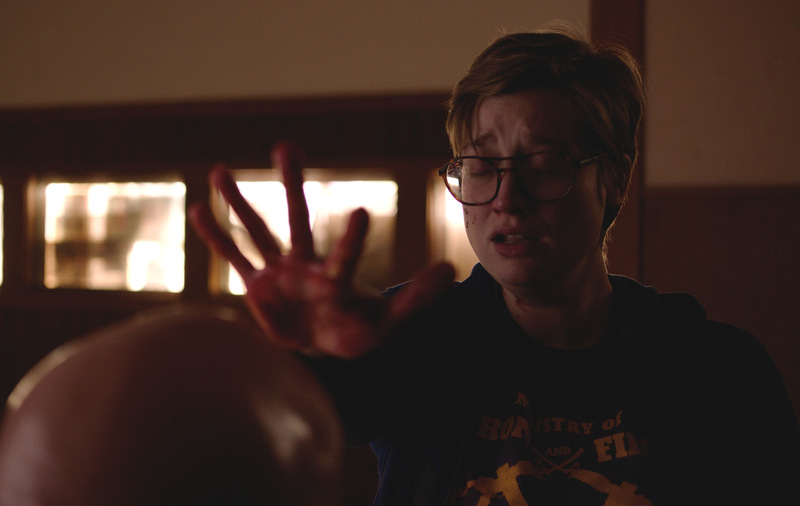
A Return, a Reckoning, a Rebirth
MOVIE REVIEW
So Fades the Light
–
Genre: Thriller
Year Released: 2025
Runtime: 1h 26m
Director(s): Rob Cousineau, Chris Rosik (Get Super Rad)
Writer(s): Rob Cousineau
Cast: Kiley Lotz, Ny'Ea Reynolds, D. Duke Solomon, William Swift, D. Lou, Anika Pyle
Where to Watch: on demand, June 24, 2025
RAVING REVIEW: Faith, trauma, and the shadows we can’t shake—this film drifts through all three with a deliberate unease. It doesn’t race toward revelation or hide behind itself; instead, it moves like its central character: cautiously, searchingly, and often in silence. With its slow-burn structure and emotionally haunted protagonist, this story sidesteps catharsis to examine what’s left behind when belief collapses. Identity needs to be rebuilt from the ground up.
The story revolves around Sun (Kiley Lotz), once the center of a religious movement that mistook her for a divine figure. Now years removed from that world, she travels the backroads of America in a van that doubles as her sanctuary and exile. Her life is solitary, shaped by a past she’s never truly confronted. When she decides to return to where it all began, there’s more than nostalgia driving her. She’s chasing answers, even if she’s not entirely ready for what might meet her there. Unbeknownst to her, the Reverend who once placed her on a pedestal is also returning. That shared destination sets the stage, but this isn’t a showdown—it’s a quiet reckoning.
What makes the journey worthwhile isn’t a string of plot twists but the encounters along the way. In different hands, these side characters might feel like background extras. Here, they’re subtle reflections of the themes. A skater at a burger joint, a lesbian couple at a campsite—they’re brief stops, yet each moment offers insight, peeling back Sun’s defenses and showing her what belief looks like without manipulation. These scenes never overstay their welcome; they feel natural without straining for impact. It's storytelling with a gentle pulse—less about propulsion, more about observation.
Lotz brings Sun to life through micro-expressions, pauses, and an uneasy stillness. Her performance is all about tension held just beneath the skin. The way she reacts to kindness or evades connection reveals the emotional scar tissue she carries. There’s a moment of confrontation later on where everything she’s bottled up snaps free, but all the quiet groundwork before that makes it hit harder. In contrast, D. Duke Solomon’s Reverend walks and talks like a figure who’s never stopped playing the role he wrote for himself. He projects authority but lacks psychological depth. The performance suggests presence, but without emotional access, he feels less like a man and more like a placeholder for an idea.
This disconnect extends into the story structure. By paralleling the Reverend’s and Sun’s return to the compound, the film tries to build tension through inevitability. It mostly works—until it doesn’t. There’s a drag during the second act when the weight of introspection starts to outweigh momentum. The eventual face-to-face feels more like a checkpoint than an earned explosion. The story wants to end on something subtle and unresolved, but a deeper payoff would have given the ending more weight. A few more scenes allowing both characters to be more than their roles could’ve pushed the finale into something more memorable.
The film's sense of purpose helps keep it on solid ground. It’s not preaching, not dragging out trauma for shock. Instead, it examines belief after the collapse, asking what’s worth saving and what needs to be burned down. The inclusion of queer characters and themes is handled with ease—not as a statement but as an everyday part of Sun’s world. This perspective adds authenticity, grounding the story in something human.
Where things falter is with the Reverend’s character arc. He enters as a man who once had power and wants it back, but the film doesn’t do enough to explore what that desire means. Is he delusional? Is he rebranding himself? The performance keeps these answers out of reach, which might be intentional, but that opacity undercuts some of the thematic weight.
There’s also a compelling idea that was briefly explored but left underdeveloped. It’s unsettling and weird and opens up questions about how we remember, who controls history, and how quickly ideology becomes something else. This subplot feels ripe for further exploration, but is dropped too quickly. It’s one of the stronger critiques the film hints at, and pushing this element further could’ve made the world feel more lived-in and the themes more sharply realized.
Ultimately, this is a character study with spiritual weight and a subtle but sincere emotional core. It doesn’t try to reinvent anything; it just offers a space to reflect. And while it may not hit every mark, the questions it leaves behind stick around long after the credits roll.
Please visit https://linktr.ee/overlyhonestr for more reviews.
You can follow me on Letterboxd, Instagram, Twitter, and YouTube. My social media accounts can also be found on most platforms by searching for 'Overly Honest Reviews'.
I’m always happy to hear from my readers; please don't hesitate to say hello or send me any questions about movies.
[photo courtesy of GRAVITAS VENTURES]
DISCLAIMER:
At Overly Honest Movie Reviews, we value honesty and transparency. Occasionally, we receive complimentary items for review, including DVDs, Blu-rays, CDs, Vinyl Records, Books, and more. We assure you that these arrangements do not influence our reviews, as we are committed to providing unbiased and sincere evaluations. We aim to help you make informed entertainment choices regardless of our relationship with distributors or producers.
Amazon Affiliate Links:
Additionally, this site contains Amazon affiliate links. If you purchase through these links, we may receive a commission. This affiliate arrangement does not affect our commitment to honest reviews and helps support our site. We appreciate your trust and support in navigating these links.



Average Rating